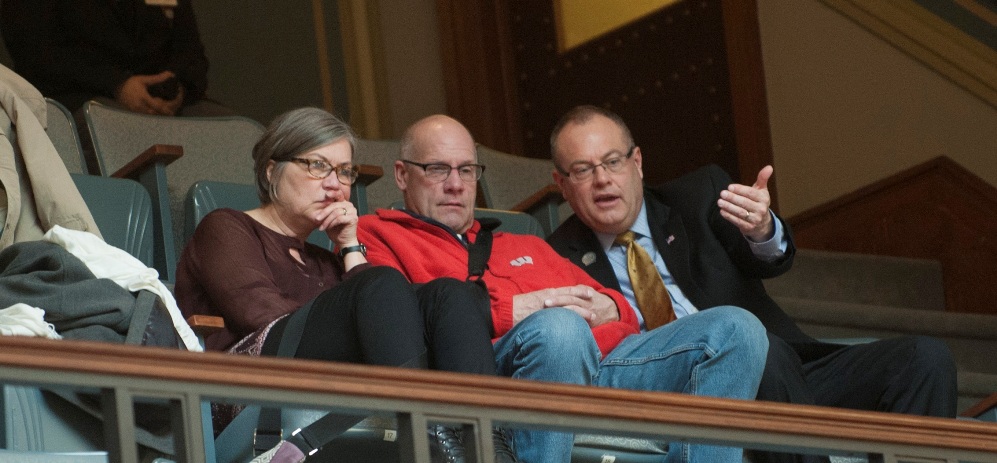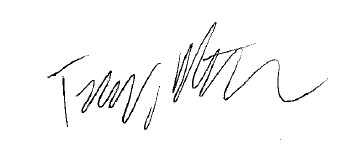|

Did you know that, when either the Assembly or Senate is in session to debate and vote on legislation, the general public may attend and watch? Usually, you don't even have to have a ticket; there is generally plenty of room in the public galleries for families or even groups of students to attend. The birds-eye view of the action in the Assembly is pretty neat; the galleries consist of a third-story balcony that surrounds the second-story Assembly floor on three sides. Watch the legislature's online calendar of events carefully to learn when we'll be in session, and let me know if you're coming!
I think we're getting pretty close to having a 2017-19 state budget deal in place. The Governor, the Senate and the Assembly all proposed fresh ideas this week, and we agree a lot more than we disagree. At the end of the day, all sides want Wisconsin to have a sustainable plan for the future that keeps taxpayers' burden under control but invests appropriately in our children's education and in our economic infrastructure. More on that below... but the conversations this week have been productive.
As always, I encourage you to follow my updates on social media or contact my office directly with your questions. Best wishes on your weekend!

2017-19 State Budget Update
Wisconsin's state budget is by far the single most important, and by far the largest, bill that our state legislature will consider in a two-year session. In Washington, DC, what the President and Congress call the "budget" is usually more of a guideline; Congress later takes additional steps to actually authorize and appropriate money, more or less according to a budget guideline. But in Wisconsin, our biennial state budget law does all these things at once; it is not only a guideline but also the legal authority that allows money to be spent. A few other legislative actions later in the two-year session may authorize the spending of a modest amount of money, but that would be a "drop in the bucket" compared to the budget bill. That's why it's important to get our state budget right -- there will be few opportunities until spring 2019, when two more years have passed, to adjust the use of taxpayer funds.
Although negotiations continue to settle a few big issues, the legislature has finished its negotiations on many topics already. Here are a few highlights about where we are today:
Very high probability of becoming law: The portion of your property taxes that goes to the state, rather than your local government, is probably going away. K-12 public schools are going to receive a significant funding increase in each year of the biennium that will total approximately $500-600 million above current levels; some of the increase will be targeted more heavily toward school districts (including several in Sheboygan County) who have historically made do with less funding than other school districts receive. College costs will be kept under control, as the existing freeze on tuition at UW schools will continue. We're increasing funding by $2 million for fighting the sexual exploitation of children, and we're increasing by 200 percent the state funds that support child runaway services. We're establishing a peer-run respite center where veterans can turn for mental health and addiction help, and we're ensuring that the center becomes incorporated in the base budget for the Department of Veterans Affairs in the future. Although the final budget is going to fund fewer state employee positions overall than the Governor proposed, there will be five new positions created at the Wisconsin Elections Commission to help ensure the freedom and fairness of elections.
Being negotiated now: It is possible that the personal property tax (a very cumbersome, complicated tax that businesses have to calculate and pay each year on the value of their business equipment) will be repealed entirely or phased out over a period of years. It is possible also, or perhaps instead, that all individual income taxpayers will see a modest reduction in tax rates across the board. Or, although the Senate and the Governor have flatly refused to consider any gas tax or vehicle registration fee increases, it is possible that a modest amount of income and sales tax dollars will be moved to pay for road projects -- so that work may continue on important investments without simply charging up the state's credit card. No expansion to the state's school choice programs is proposed, but many more middle-class families may become eligible to participate in the existing programs by increasing the maximum eligible family income.
Once both houses of the legislature pass an identical budget bill, it will head to Governor Scott Walker. The Governor will likely preserve most of what the legislature approves, but he has a powerful line-item veto that he may use to delete provisions that he does not approve. I am eager to vote soon to pass a comprehensive bill that invests in our future and keeps Wisconsin heading in the right direction.
Updates from State Agencies
The Department of Workforce Development has announced the launch of WisConnect, a new marketplace for Wisconsin internship opportunities. All college students with an active .edu email address can create an account, upload their resumes and search for opportunities by geography, college major, etc. Employers with existing JobCenterofWisconsin.com profiles can use their existing sign-in information to access WisConnect, and internship opportunities posted on JobCenterofWisconsin.com are automatically featured on WisConnect as well. There are also many new resources for students to learn how to search for opportunities, prepare for interviews and much more. In 2016, I proudly voted in support of Wisconsin Act 283, part of Governor Walker's college affordability package, which directly helped increase the availability of internship opportunities in Wisconsin and led directly to the creation of WisConnect. Give it a try!
The Department of Natural Resources reminds sportsmen and sportswomen that permit applications are due by August 1st for several fall hunting and trapping seasons including fall turkey hunting. It's also not too early to think about getting your deer, archery, pheasant, small game and other licenses squared away before those seasons approach. Licenses and applications may be purchased online at GoWild.wi.gov or at DNR service centers and sales locations.
The Department of Revenue maintains a website designed to help businesses identify tax incentives that may be available to them in Wisconsin. These tax deductions, credits and grant programs are intended by the legislature to help grow the state's economy. The website includes an "interactive incentives finder" that helps business owners determine what they may be eligible for. There are also tools on the website that local governments will find useful such as information on tax incremental financing districts.
|

